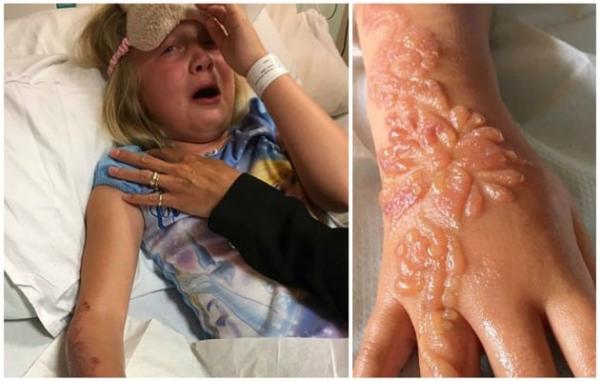
What was meant as a fun souvenir of a trip to Egypt has become a painful nightmare for this seven-year-old British girl.
Madison Gulliver was on vacation with her family in Egypt when her father allowed her to get a henna tattoo in the spa at their four-star hotel.
The tattoo started itching
The design was beautiful and she was happy with it until she went home and it started to itch. The family didn't know why, but the little girl was having a serious allergic reaction to the black henna the salon in the hotel used.
Her father said, "We noticed there was a small patch on the top of the tattoo that was raised but we couldn't see any redness ... The next morning the whole tattoo was starting to get itchy, so we washed it off which revealed a rash in the outline of the tattoo."
She had to be hospitalized
It eventually got worse, and Madison went to the hospital where she was treated for chemical burns. Now, they're warning others about the dangers of black henna.
Madison's parents were extremely upset about the whole ordeal, and they had no idea the damage the henna could do to their daughter's skin. Her dad told Good Morning Britain, "It was just advertised as a henna tattoo, and it was a treat for her while we were on holiday ... it wasn't cheap and it was done in the hotel's own salon."
Beware of black henna
According to Refinery29, Black henna isn't actually natural henna, and it's illegal in the UK and in the US. It contains a chemical used in hair dye, called PPD. Lisa Butterworth, a henna artist, says that "people often get black henna done at tourist-heavy vacation spots."
Butterworth also gave tips on how to know whether or not your artist is using natural henna. First, ask if it's real. If they say it is and you're still suspicious, there are some ways you can tell.
First, natural henna takes about 6 hours to really set in and stain the skin, so if your artist says you can wash it off in an hour, it's probably the chemical stuff. Natural henna also stains brown, not black.
But, Butterworth says the easiest way to tell if the henna is natural is by the way it smells. She says, "Black henna smells chemically ... Natural henna smells of essential oils. It smells nice."
It will affect her forever
They're hoping Madison's scar goes away in a couple of years, but now that she's had an allergic reaction to the PPD, she's more prone to reactions to other things. PPD is found in hair dye, some sunscreens and many other things, so now Madison has to be extra careful with what she puts in her body and on her skin. Her parents shared that she has already had an allergic reaction to Penicillin when she never had before, even though it doesn't contain PPD.
Her mom posted on Facebook about the ordeal, and is warning others about the dangers of black henna. She said, "It's too late for Maddie now however, by sharing this post and spreading the word a little more, we might stop more adults/children going through painful burns and a life time of [allergies] to PPD."
This article was adapted and translated from the original "Menina de 7 anos fica com cicatrizes permanentes no braço por causa de tatuagem de henna" which was originally published on familia.com.br.

